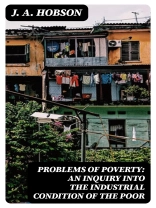In ‘Problems of Poverty: An Inquiry into the Industrial Condition of the Poor, ‘ J. A. Hobson offers a penetrating analysis of the socioeconomic challenges faced by the working class in early 20th-century Britain. Through a rigorous exploration of industrial conditions, Hobson employs a blend of empirical observation and sociological inquiry, articulating the multifaceted nature of poverty as deeply intertwined with structural inequalities, such as capitalism’s inherent tendencies. His literary style is marked by clarity and eloquence, utilizing case studies to illustrate systemic issues, allowing for a deeper understanding of the plight of the impoverished populace. Hobson, an influential economist and social critic, was profoundly affected by the stark contrasts he observed in industrial society. His exposure to the harsh realities of poverty throughout his career, coupled with his commitment to social reform, directed his scholarly pursuits toward understanding the root causes of economic disparities. His earlier works on imperialism and the critique of capitalist ideologies provide a solid foundation for the arguments he presents in this crucial text. This book serves as a call to awareness and action, making it essential reading for scholars, policymakers, and anyone interested in social justice. Hobson’s insights are not only historically significant but also resonate in contemporary discussions around economic inequality, making this inquiry a vital contribution to both economic theory and social advocacy.
A propos de l’auteur
J. A. Hobson (1858–1940) was a notable English economist, social scientist, and critic of imperialism widely known for his contribution to economic theory and his critique of colonialism. Born in Derby, he was educated at Lincoln College, Oxford, before delving into a career that combined journalism, academia, and social activism. Hobson authored several influential books, among which ‘Problems of Poverty: An Inquiry into the Industrial Condition of the Poor, ‘ stands out as a seminal work in the field of social economics, examining the causes and impact of poverty in the industrial society of his time. His analysis in this book, and others, showcased his progressive view on income distribution and his advocacy for economic reforms to mitigate societal inequities. Hobson’s literary style is characterized by its clarity, analytical depth, and a strong ethical concern for the well-being of the impoverished. His writings bear the mark of a reformist keen on not just diagnosing the ills of society but also suggesting pragmatic solutions, therefore influencing both policy and academic discourse in the early 20th century. His critique of imperialism in ‘Imperialism: A Study’ further solidifies his standing as a critical thinker not afraid to challenge the status quo. Today, Hobson’s work continues to garner interest for its historical significance and its enduring relevance to issues of economic inequality and social justice.












